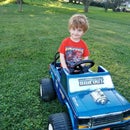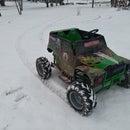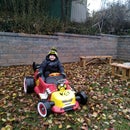Introduction: Installing New Motors on Power Wheels
I wanted to add some speed/torque to this sweet vintage 1989 1st Gen Bigfoot Power Wheels. The original motors are 28 years old and definitely aren't what they once were. I got a few new parts off Amazon and I'm going to make this thing a little faster.
Here's a materials list of what you'll need to complete this project:
2x Traxxas Titan 21t 550-sized motors
2x 10 tooth pinions - (please note: your model may require different tooth count. COUNT YOUR TEETH before ordering pinion gears! )
2x 550-sized Aluminum Heat Sinks (this is for a 2 pack, pretty good deal imo)
DISCLAIMER: YOU ARE MODIFYING THE ELECTRICAL SYSTEM ON A CHILD'S RIDE-ON TOY. IF YOU'RE UNSURE OF ANYTHING, DON'T DO IT. I don't want to hear that you set your kid on fire, seriously.
Step 1: Remove Push Nuts
Start by taking off the wheels. The little black thing in the middle is called a push nut. They suck. You're pretty much guaranteed to break them while taking them off.
Your options to replace them are either threading the axles and using nyloc nuts, using shaft collars or just breaking down and buying new push nuts. Shaft collars are the fastest/easiest way, but they're kind of expensive.
Step 2: Slide Off Wheels and Gear Boxes
The wheels slide right off. Behind them are the black gear boxes, with the motors attached. Disconnect the wires and slide off the gear boxes.
Step 3: Remove the Stock Motor
The two little flathead screws hold the motor into the gear box. Remove those to get your motor out. The 3 philips head screws open the gear box itself. You can look in there if you want, but it's not necessary for this project.
Second picture is a side shot showing the gearbox and the new motor. Your gear box will probably look different, this is a very old example. The newer ones are similar in function, but a little beefier and have different cases.
Third picture shows the motor out, you can see it has a plastic pinion gear on its shaft. That's what connects the motors rotation to the gears in the gear box. Newer models will have metal pinions pressed on. You'll need new pinions either way.
Step 4: Replace Pinion and Reinstall Motor
Making sure the tooth count and diameter line up exactly between new pinion and old. If you use the wrong tooth count, you're going to strip out your gear box. This was a 10 tooth pinion.
The pinion installs by slipping over the shaft on the new motor and locks on with a tiny set screw. I used some blue thread lock to help hold the set screw in place.
Then I reinstalled the new motor into the gear box. Just mesh the gears together and put the two little screws back in.
Step 5: Connect the Wiring
Next I worked on hooking up the wires. Do a test fit first to make sure you have both wheels rotating the same direction. If one is backwards, just switch the wires between terminals.
The new motors have bullet connectors. If you want to be fancy, you could solder female bullet connectors to the vehicle wiring. I'm not fancy, I just stripped the wires, put them into the bullet connectors and crimped the connection. Then I wrapped it in electrical tape. Heat shrink tubes would be slightly more professional.
Step 6: Secure Wiring, Install Heat Sinks
Then I zip tied all the wires securely out of the way before installing the heat sinks. The heat sinks just snap on. They help keep the motors cool during extended driving sessions. Overheated motors can cause several different sorts of failure, so I like to slap heat sinks on whenever I do a motor upgrade.
Step 7: Play!
A couple of finished shots on the bench and it's ready to play!
Test drive proves successful and the kiddo loves it!
I'm always tinkering with making my kids' toys crazier, so if you're interested, Check out my newest projects on Instagram https://www.instagram.com/poppafixit/
Thanks for reading and best of luck with your projects!




